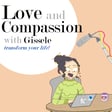
Ep. 74-Dignity and Forgiveness at Work with Dr. Jenn Griggs
TRANSCRIPT
Jenn Podcast Recording Forgiveness at Work
Gissele: [00:00:00] Hello, and welcome to the Love and Compassion podcast with Gissele. We believe that love and compassion have the power to heal our lives and our world. Don’t forget to like and subscribe for more amazing content. Today we’re gonna be talking about forgiveness.
My guest is Jennifer Griggs. She’s a renowned oncologist, researcher, leadership coach, and a narrative medicine practitioner. After a traumatic event at work, she had to learn to forgive, and in the process became a scholar of forgiveness and dignity. She leads a brilliant and passionate team that works to improve the quality of cancer care in Michigan USA by making good trouble.
She hosts the podcast. The Dignity Lab collaborates widely with creative people. Mothers, her two young adult daughters, supports her husband’s theater ventures and takes delight in the oak trees and bird songs in the woods where they live. Please join me in welcoming Jennifer.
Hi, [00:01:00] Jennifer.
Jenn: Hi. It’s great to see you.
Thanks for the opportunity.
Gissele: It’s great to see you too. I’m so excited to talk about forgiveness. I’d like to start, by asking you to tell the audience a little bit about how you got started in this work.
Jenn: Well, thank you. Thanks again for having me.
When I discovered dignity, everything fell into place for me. So I consider myself a scholar of both. I think without understanding dignity, it’s hard for us to know why something hurt. It’s hard for us to take accountability for our part when.
Applicable. And I think it’s hard to see a way out of that victim stance. when I learned to forgive, I actually looked back on my whole life and realized I’d been a person of grievance. I had grievances against people going back to early in my life and found that I was oppressed by my own stance towards what had happened.
So for me, forgiveness has meant freedom, [00:02:00] dignity has made it fall into place and it’s. Paved a path forward for me. So forgiveness to me is giving up all hope of a better past in search of a better future.
Gissele: Hmm. I love that. I love that. And it takes a level of courage to be able to look at yourself and your history and acknowledge that you are person full of grievances.
Right? It’s much, much easier it feels to blame other people for those grievances. So I applaud that courage. I wanted to ask you what dignity means to you.
Jenn: Dignity originally meant somebody of value and worth. What’s interesting is when the Human Rights Commission in the 1950s came out with their statement of human rights, dignity was reconceptualized as our inherent worth or value.
Unlike respect, it doesn’t have to be earned. We’re born with dignity. From the minute we’re born, we have worth and value. No one would argue that a little baby who I think has net [00:03:00] negative when they’re first born, before they smile, has value and worth.
Gissele: And and that’s certainly true. I mean, when I think of babies, you’re right,
they’re just naturally deserving of love, and I feel that way about every human being. Can you tell me a little bit about the work that you do in terms of forgiveness at work? In my experience. There hasn’t been a lot of forgiveness at work. workplaces tend to use a very punitive approach instead of more curiosity.
how have you found the forgiveness at work piece has been received by workplaces?
Jenn: Really, I work mostly with people who’ve been hurt at work, and the thing that is very clear is that systems can violate dignity, a
